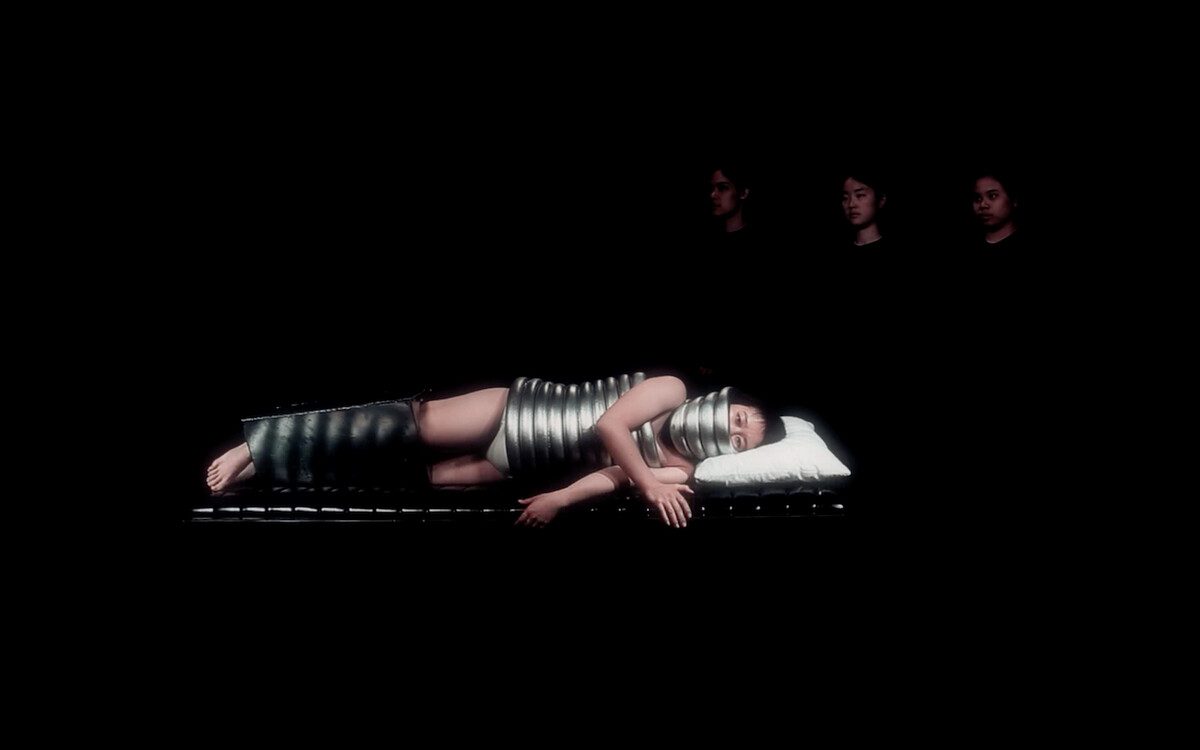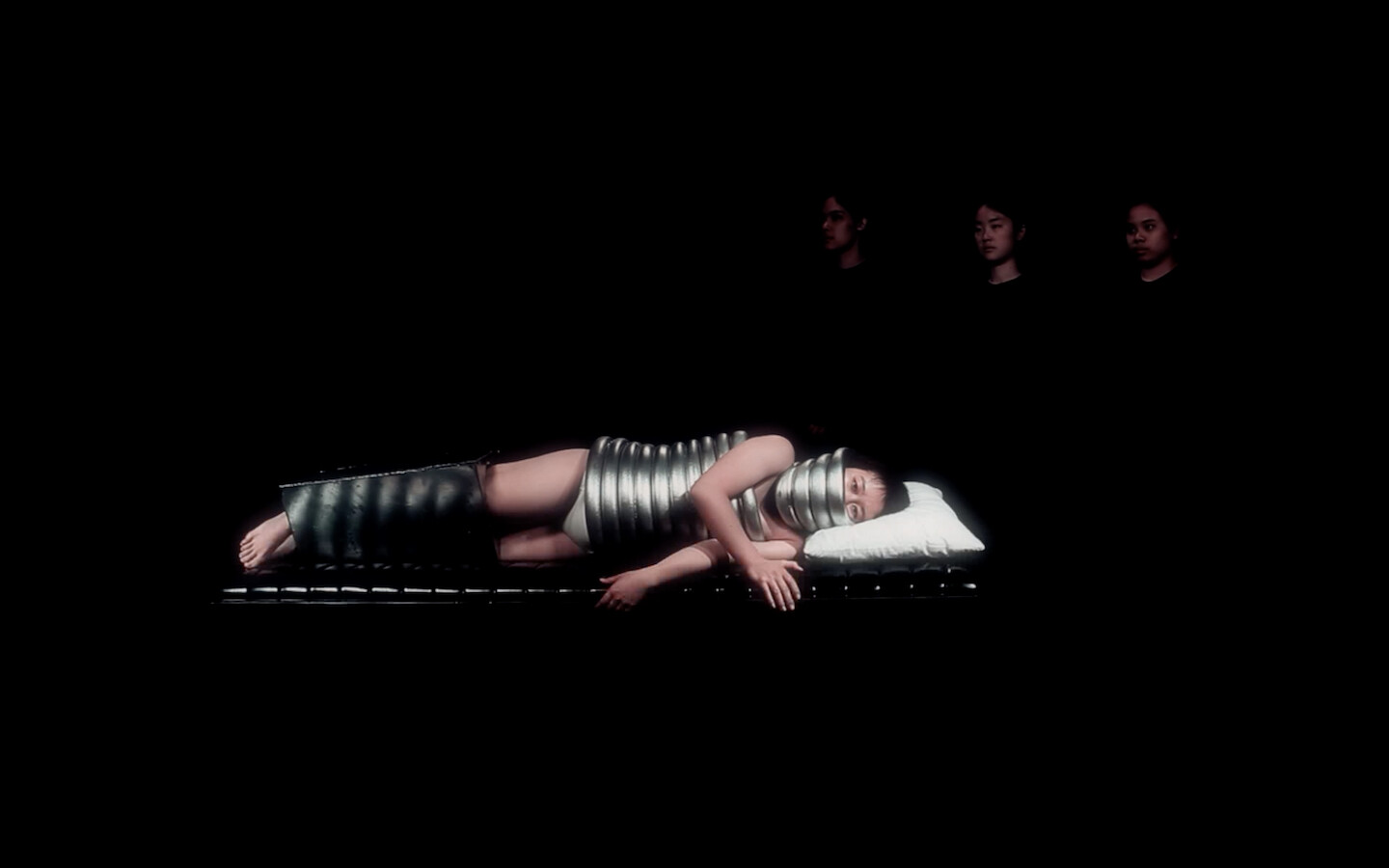Screening and discussion
Admission starts at $5
June 6, 2024, 7pm
Brooklyn, NY 11205
USA
Join us at e-flux Screening Room on Thursday, June 6 at 7pm for Labor, Liquidation, and Resistance, a screening of selected works by Jen Liu featuring The Land at the Bottom of the Sea (2023), Pink Slime Caesar Shift: Electropore (2021-22), Pink Slime Caesar Shift: Gold Loop (2021), and The Machinist’s Lament (2014). The screening will be followed by a discussion with the artist.
From the allegorical focus on labor activism in contemporary China in The Land at the Bottom of the Sea to the speculative narrative on biopower and genetic engineering in Pink Slime Caesar Shift: Electropore, Jen Liu’s films from recent years explore the impact of globalization and technological advancements on labor rights and environmental conditions, with an emphasis on China’s evolving socio-economic landscape. Pink Slime Caesar Shift: Gold Loop delves into the implications of first-world recycling practices on third-world biopolitical landscapes, while The Machinist’s Lament reflects on the historical shift of industrial productivity from America to Asia, critiquing the mythologized view of American industrial history and the harsh realities of globalization. Collectively, through a mix of speculative fiction and documentary elements, Jen Liu offers a visually compelling critique of contemporary labor conditions, environmental degradation, biopolitical control, and the enduring influence of historical narratives on present-day socio-economic realities.
Films
The Machinist’s Lament (2014, 17 minutes)
American industrial production is a site of magical thinking: an ancient history that will never return, but also an idealized mythology of a society that never really was. This piece considers the handover of industrial productivity from America to Asia in the mid-twentieth century as a series of aestheticized masks, fragmented words, and decontextualized concepts. What is a lament for offshoring, a song and dance for globalization’s permanent fracturing of the labor landscape? Video footage was shot in Ohio, animation and soundtrack by the artist. Voiceover text sources include industrial supply catalogs, OSHA safety manuals, Monique Wittig’s Les Guerilleres, and Adorno’s Minima Moralia.
Pink Slime Caesar Shift: Gold Loop (2021, 28 minutes)
Pink Slime Caesar Shift: Gold Loop reflects on the disappearance of labor activists in China, the resulting possibilities of political resistance, and e-waste (old computers, cell phones, and other domestic electronics). Firsthand accounts of female electronics workers in South China are cut together with corporate and industrial texts to investigate the physical, legal, and biochemical realities of gold extraction from e-waste. Live action video and animation explore the psychogeography of “virtuous” first-world recycling vs third-world biopolitical devastation. Themes of mirroring, mutation, and disintegration are grounded in considering electronics that poison bodies in their initial production as well as in their return for disassembly, an infernal eternal return, a “gold loop.”
Pink Slime Caesar Shift: Electropore (2021-22, 11 minutes)
Four womxn form a labor circuit, generating electricity for cheap gadgets: Their biopower powers the infinitely disposable. This piece is named for electroporation—a method of genetic engineering in which cells are electroshocked into compliance—and is inspired by Fred Ho and Ann T. Green’s Warrior Sisters: The New Adventures of African and Asian Womyn Warriors (2000). In the original, Fa Mulan, Nana Yaa Asantewaa, and Sieh King King rescue Assata Shakur from jail, using the lightning power of Mulan to travel through time and space. Here, that power has been absorbed into the network grid, a form of entrapment instead of liberation. Non-fiction voiceover texts include a firsthand account of the female carceral data labor complex: prisoners busy at data entry for ADP/UNICOR.
The Land at the Bottom of the Sea (2023, 27 minutes)
What happens if you are liquidated—financially, socially, politically, environmentally? Under what conditions is it possible to survive? The conditions for labor activism in China have greatly changed since 2016, symptomatic of larger changes in the global economic and political landscape. This film considers these changes as a series of deaths: the death of Chinese labor NGOs, unable to survive in the face of overwhelming governmental force; the death of techno-optimism, unable to provide any solutions to concrete environmental and social problems; and the impending death of a body of artwork, which has been unable to assess future possibilities with any truth. Firsthand accounts of industrial workers and worker poetry are embedded within other nonfiction sources, woven into a melancholic elegy alongside a visual narrative depicting failed social encounters with mermaids. The melancholic poetry of this film is just a candy shell, however: Packed within its digital body is an assembled archive of disappeared women activists, tens of thousands of digital proofs of the existence of fighting women, preserved against the dissolution of memory.
For more information, contact program@e-flux.com.
Accessibility
– Two flights of stairs lead up to the building’s front entrance at 172 Classon Avenue.
– For elevator access, please RSVP to program@e-flux.com. The building has a freight elevator which leads into the e-flux office space. Entrance to the elevator is nearest to 180 Classon Ave (a garage door). We have a ramp for the steps within the space.
– e-flux has an ADA-compliant bathroom. There are no steps between the Screening Room and this bathroom.

